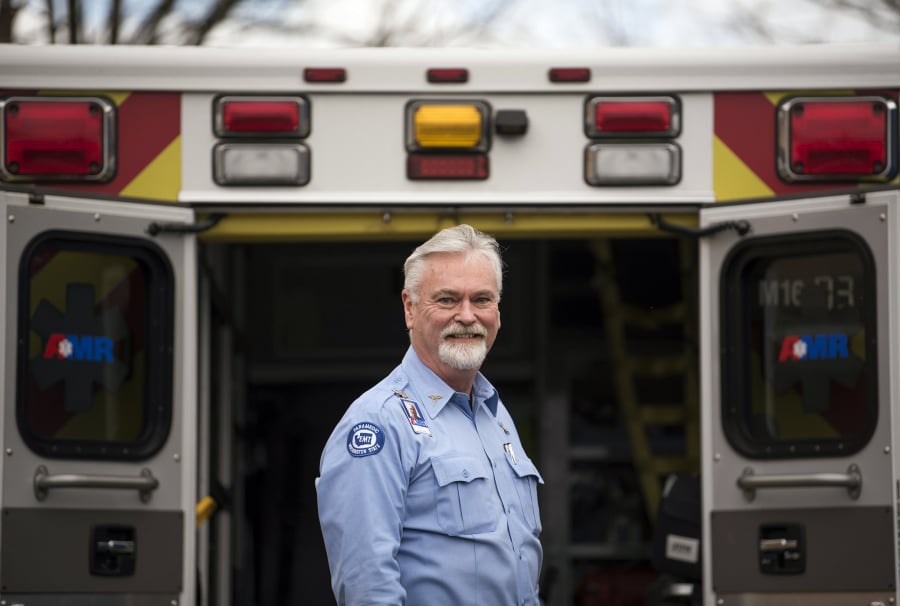Vancouver’s Rick Futrell leafed through his reams of newspaper clippings, photos, commendations and other documents built up over more than 40 years working on ambulances.
“I think what really keeps me in the business is loading up people with stinky feet,” he joked, pointing to an old newspaper clipping where Futrell, his back visibly bent, is rolling someone with wrapped feet into the back of an ambulance.
Futrell, 64, plans on retiring from American Medical Response at the end of the year, marking 45 years in emergency medicine, with almost all of those years spent working on the road.
While on an ambulance, he was a reserve Battle Ground police officer for 13 years, a firefighter for more than 20 years, occasional court bailiff, Memorial Coliseum security guard, medic for hydroplane races in the Tri-Cities, and a rescue diver.
His collection of emergency services patches and pins spans local fire departments and ambulance companies that have long since been bought up or merged into other agencies, and comes with countless stories of work on the road.
“According to what people are telling me, I’m like a dinosaur. I’m starting to feel like a stalactite, a fossil,” he said at his home in mid-February.
Still, he feels good. His six children are married and doing well, his savings are secure, and all his toys, his prize Harley-Davidson Chief among them, are paid for.
He spent several years in management, but decided he wanted back on the street, “where it was safe. Among the blood and the guts and the beer.”
Even when he was in management, he’d still take shifts on the road.
“I literally didn’t like being in an office. I wanted to be outside,” he said, adding that’s what he’ll miss, being out in the street and with people.
Early days of paramedicine
Futrell got started with emergency medicine not long after finishing high school in Hollywood, Calif., where he’s from.
He was told that if he took a few classes, he could probably get a job on an ambulance fairly easily.
“My first assignment, to be broke in: Downtown L.A., between the Bloods and the Crips, and I was on Hoover Street,” he said. “That was nice.”
In 1974, the year he started, the breadth of knowledge he was expected to have wasn’t much more than first aid, he said. The pre-hospital emergency care we know today was barely out of its infancy.
Becoming a certified “emergency medical technician” was a new concept, and guys like him learned rescue breathing instead of CPR.
“What’s CPR?” he recalled thinking.
But more people were coming back from Vietnam, or earlier conflicts, wanting to apply to civilian life what they learned treating the wounded during war.
“That’s how paramedicine started, in saying, ‘Why are we not using these people and their talents and skills?’ ” he said.
In 1966, an analysis of emergency care from the National Academy of Sciences found, among other things, soldiers seriously injured in Vietnam had better survival rates than people seriously hurt in car crashes on California’s highways, and it helped lead to the creation of modern emergency medical services.
His career’s worth of artifacts includes a binder, thick with baseball card sleeves, that holds the many cards showing all the new and different certifications he’s had to attain or refresh for work.
That’s been a constant theme throughout the years, he said: what was once the new wonder drug falls out of favor, procedures change as doctors find better methods, or advances in technology and research drive new ways to work.
His paramedic class was the first of its kind at Chemeketa Community College in Salem, Ore., and he still has a copy of the textbook. It was one of the first of its kind. It came as loose-leaf paper in a binder, so hot off the press the printers forgot to include page numbers and had to write them in by hand.
He pointed to another photo, in another scrapbook, from his six-year stint in management.
“We had just started wearing gloves,” he said. “This is back when we were doing mouth-to-mouth on people who were puking in our mouths and stuff. You would never do that now! No way!”
Tales to tell
It wasn’t long after starting that he was hooked.
“When I started in Los Angeles, it was such an adrenaline rush,” he said. “All of a sudden, you’re just racing up and down the highway. It became a real adrenaline rush and it gets in your blood, and it’s hard to stop.”
Futrell spent a couple of years in L.A., then came to the Vancouver area, where he worked with several now-defunct ambulance companies and local fire districts.
While still working as a medic, he also worked part-time with the Battle Ground fire and police departments. At the latter, he was part of the county’s first bicycle patrol unit, complete with short shorts and a 10-speed bike he picked up at a garage sale.
When Mount St. Helens erupted, he shuttled patients, monochromatic with ash, from military helicopters landing at Pearson Field to local hospitals.
While stacking sandbags in an effort to save a house during the floods of 1996, he nearly drowned after falling into a culvert of rushing water, before others pulled him out.
In 1994, the American Ambulance Association presented Futrell with the Star of Life award, and in 2000, the Red Cross honored him after he risked his own safety to help a man who had been shot in the chest.
He saved a group of Meadow Glade kindergartners from no doubt a lifetime of therapy by rescuing a bird tangled in fishing line and snagged in a tree outside their classroom.
One Easter, while he was off-duty, he resuscitated a man who had a heart attack outside his home. The man returned a year later with his baby granddaughter, thanking Futrell for the chance to meet her.
“Talk about tears,” Futrell said.
Avoiding burnout
People are curious about the wild stuff, the horrible stuff, people in his line of work see, Futrell said.
It’s not something they want to think about, he said, but at the same time, even the young, new medics he works with sometimes can’t remember their first call that day by the end of a shift.
“I think our brain has the computer ability to hit control-alt-delete, because you can’t take that stuff home with you. It’s too much,” he said.
When he helped train future paramedics through Oregon Health & Science University and Central Washington University, his reputation among the students for staying cool under pressure earned him the nickname “Iceman.”
“And this was before ‘Top Gun,’ ” he said, joking that he thought he had killed someone.
When asked about his career’s longevity, he says what works for him is perspective and positivity.
“I always looked at it as a hobby, not a job, although you get paid for it,” he said. “I tell people, look, we all burn out. But the thing that you don’t understand is burnout is not permanent unless you make it permanent.”
Futrell said he burns out about every five years, but he makes a point to really get away from his work every now and then.
“You take time off from what you love. You get away and you go do the things you want to do and then you come back when you’re ready.”
Life in emergency medicine is getting busier all the time. New medics fly through breaks and lunches, and the occasional 24-hour shift without a call are long gone.
He said he’s found getting through all that chaos is a matter of seeing the cloudy sky as partly sunny and the low glass as half-full.
“I have always tried to be very positive, because we have two choices,” he said. “One, we can laugh. Or two, we can cry. I’d just as soon laugh.”




